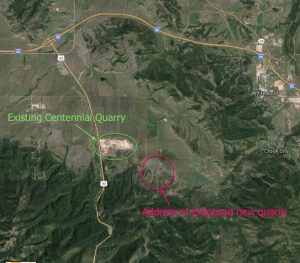
Lawrence County voters have successfully referred a quarry permit to a special vote on August 30, but their county commission has rejected a companion initiative effort to amend the county’s
In early June, the Lawrence County Commission approved a conditional use permit with 42 conditions for Mountain View Ranches, LLC, of Rapid City to dig a 192-acre quarry south of Crook City Road in Centennial Valley, between Deadwood and Whitewood. Neighbors opposed to the dust, noise, and other possible pollution began circulating petitions to block the quarry. One petition sought to refer the permit to a public vote; the other sought to amend the county zoning ordinance to more clearly regulate quarries. Petitioners gathered over 1,100 signatures on both petitions.
On Tuesday, the Lawrence County Commission approved the referendum petition but rejected the initiative petition, taking State’s Attorney Bruce Outka’s advice that citizens should not be allowed to initiate zoning ordinances:
“My final advice to the county commission is that the initiated petition is inappropriate,” Outka said, later citing the fact that the petition process skirts the due process measures built into the county’s ordinance development and amendment processes, such as public hearings, that allow for public input. “I think SDCL (South Dakota Codified Law) 11-2-28 would be the appropriate way to consider changes. The due process requirements for a public hearing are contained in both state law and in the zoning ordinance” [Jaci Conrad Pearson, “Initiative Petition to Change Lawrence County Zoning Ordinance Fails,” Black Hills Pioneer, 2016.07.13].
SDCL 11-2-28 says that changes in the comprehensive county plan “may be requested through a petition by twenty percent of the landowners in the zoning district or districts requesting change.” But SDCL 7-18A-9 says, “The right to propose ordinances and resolutions for the government of a county shall rest with five percent of the registered voters in the county….” One could argue that the comprehensive county plan statute does not exclude the more general county initiative provision. SDCL 11-2-28 may create a special process by which 20% of neighboring landowners may propose changes to this specific subset of county ordinances, but that language does not change the general authority granted by SDCL 7-18A-9 to propose ordinances of any sort.
SDCL 7-18A-13 tells county commissions what to do when they receive an initiative petition:
If a petition to initiate is filed with the auditor, the auditor shall present it to the board of county commissioners at its next regular or special meeting. The board shall enact the proposed ordinance or resolution and shall submit it to a vote of the voters in the manner prescribed for a referendum within sixty days after the final enactment. However, if the petition is filed within three months prior to the primary or general election, the ordinance or resolution may be submitted at the primary or general election [SDCL 7-18A-13].
There’s a lot of shall in that statute, and no except. Lawrence County voters presented an initiative petition with sufficient signatures; SDCL 7-18A-13 makes clear the Lawrence County Commission shall accept that petition and put the proposed changes to a vote. Petitioners, call the judge!